Ernst & Young Global Limited: Accounting's Role and Budgeting Impact
VerifiedAdded on 2023/07/13
|42
|9411
|406
Report
AI Summary
This report delves into the critical role of accounting within Ernst & Young Global Limited (EY) in the United Kingdom, examining its purpose and scope in complex operating environments. It highlights the accounting function's significance in informing decision-making, meeting stakeholder expectations, and addressing ethical, legal, and compliance issues. The report covers the main branches of accounting, required job skillsets, and the integration of technology in modern accounting systems. Furthermore, it includes a memorandum detailing cash budgeting exercises, analyzing changes in the master budget under various scenarios, and discussing the benefits and limitations of budgetary planning and control. The analysis provides insights into how budgets facilitate effective resource planning and control within an organization like EY.
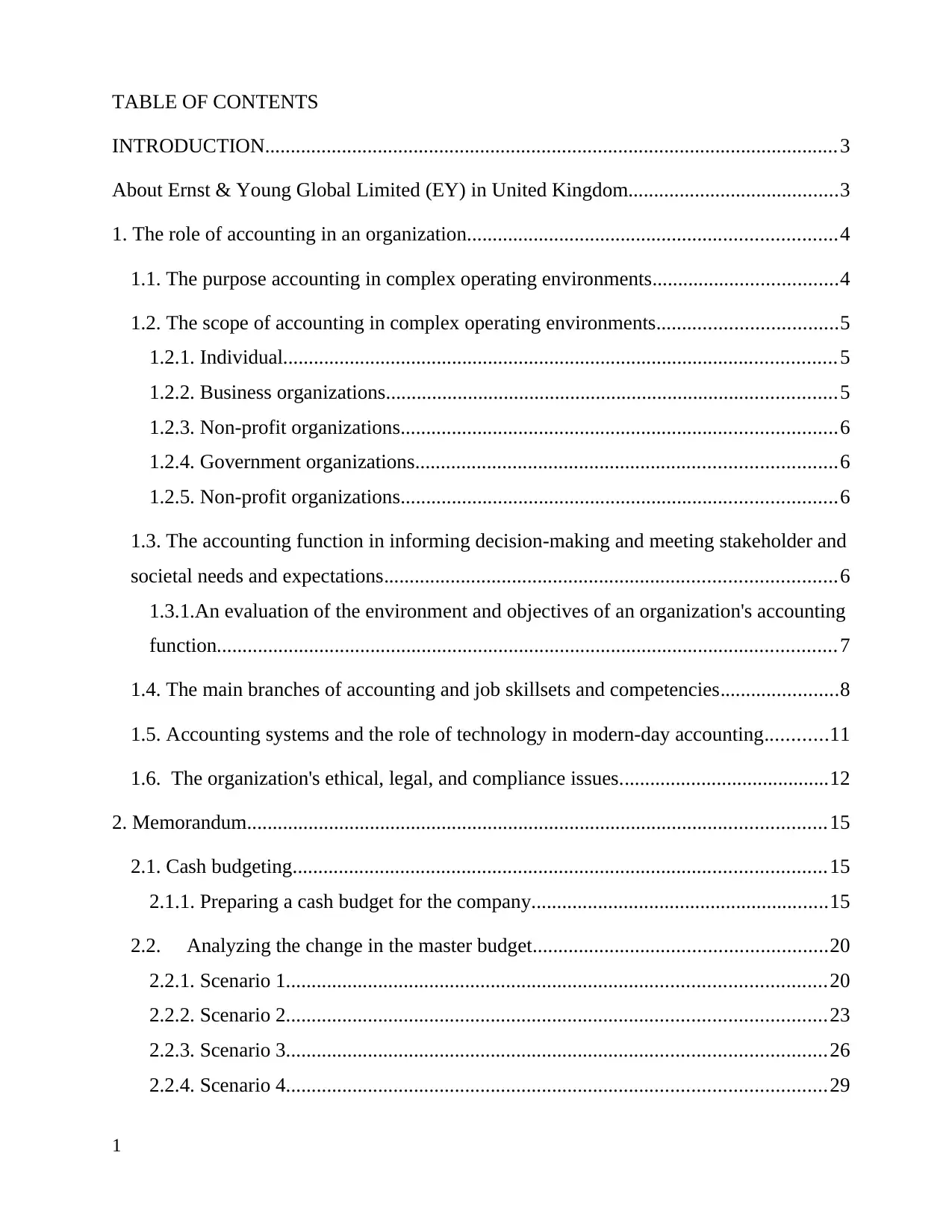
TABLE OF CONTENTS
INTRODUCTION................................................................................................................3
About Ernst & Young Global Limited (EY) in United Kingdom.........................................3
1. The role of accounting in an organization........................................................................4
1.1. The purpose accounting in complex operating environments....................................4
1.2. The scope of accounting in complex operating environments...................................5
1.2.1. Individual............................................................................................................5
1.2.2. Business organizations........................................................................................5
1.2.3. Non-profit organizations.....................................................................................6
1.2.4. Government organizations..................................................................................6
1.2.5. Non-profit organizations.....................................................................................6
1.3. The accounting function in informing decision-making and meeting stakeholder and
societal needs and expectations........................................................................................6
1.3.1.An evaluation of the environment and objectives of an organization's accounting
function.........................................................................................................................7
1.4. The main branches of accounting and job skillsets and competencies.......................8
1.5. Accounting systems and the role of technology in modern-day accounting............11
1.6. The organization's ethical, legal, and compliance issues.........................................12
2. Memorandum.................................................................................................................15
2.1. Cash budgeting........................................................................................................15
2.1.1. Preparing a cash budget for the company..........................................................15
2.2. Analyzing the change in the master budget.........................................................20
2.2.1. Scenario 1.........................................................................................................20
2.2.2. Scenario 2.........................................................................................................23
2.2.3. Scenario 3.........................................................................................................26
2.2.4. Scenario 4.........................................................................................................29
1
INTRODUCTION................................................................................................................3
About Ernst & Young Global Limited (EY) in United Kingdom.........................................3
1. The role of accounting in an organization........................................................................4
1.1. The purpose accounting in complex operating environments....................................4
1.2. The scope of accounting in complex operating environments...................................5
1.2.1. Individual............................................................................................................5
1.2.2. Business organizations........................................................................................5
1.2.3. Non-profit organizations.....................................................................................6
1.2.4. Government organizations..................................................................................6
1.2.5. Non-profit organizations.....................................................................................6
1.3. The accounting function in informing decision-making and meeting stakeholder and
societal needs and expectations........................................................................................6
1.3.1.An evaluation of the environment and objectives of an organization's accounting
function.........................................................................................................................7
1.4. The main branches of accounting and job skillsets and competencies.......................8
1.5. Accounting systems and the role of technology in modern-day accounting............11
1.6. The organization's ethical, legal, and compliance issues.........................................12
2. Memorandum.................................................................................................................15
2.1. Cash budgeting........................................................................................................15
2.1.1. Preparing a cash budget for the company..........................................................15
2.2. Analyzing the change in the master budget.........................................................20
2.2.1. Scenario 1.........................................................................................................20
2.2.2. Scenario 2.........................................................................................................23
2.2.3. Scenario 3.........................................................................................................26
2.2.4. Scenario 4.........................................................................................................29
1
Paraphrase This Document
Need a fresh take? Get an instant paraphrase of this document with our AI Paraphraser
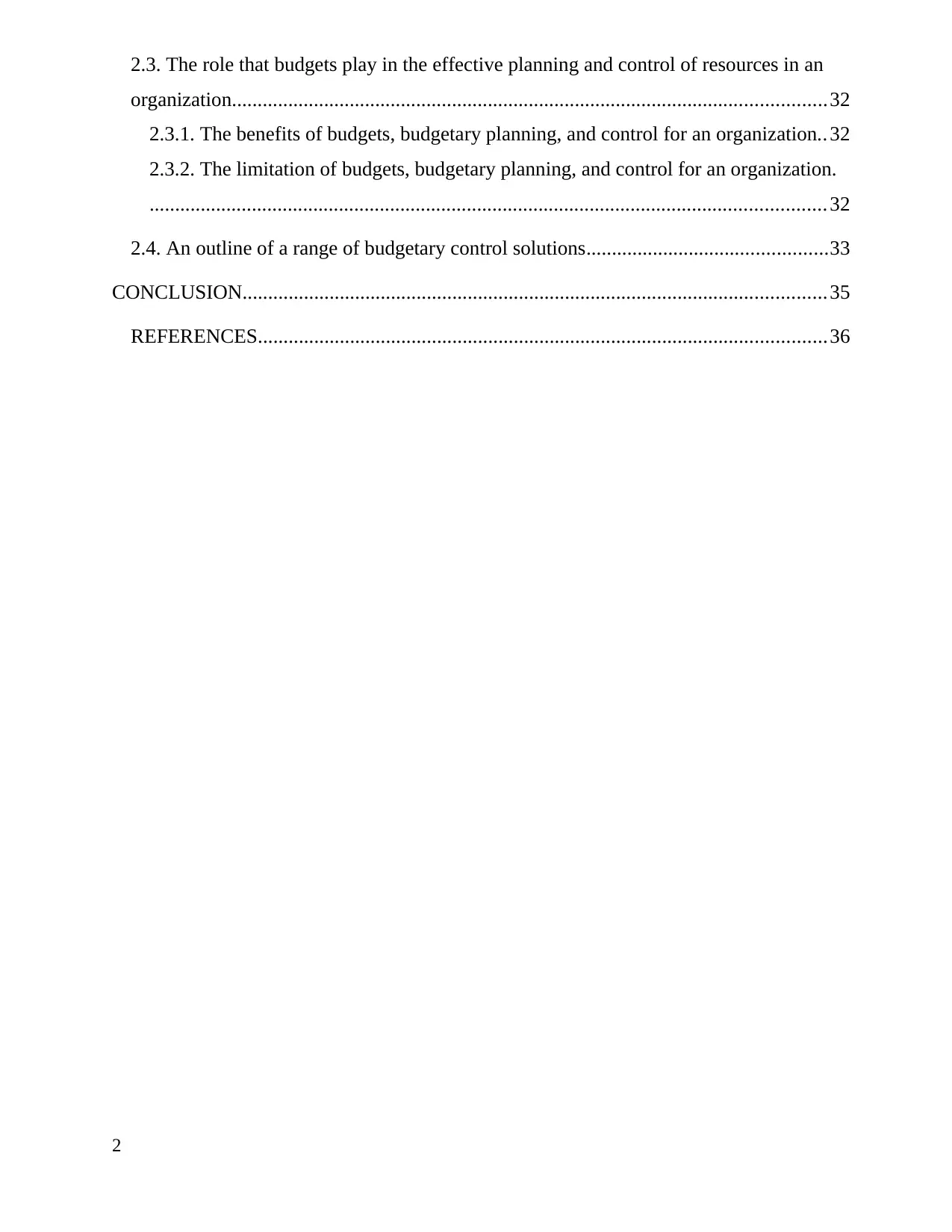
2.3. The role that budgets play in the effective planning and control of resources in an
organization....................................................................................................................32
2.3.1. The benefits of budgets, budgetary planning, and control for an organization.. 32
2.3.2. The limitation of budgets, budgetary planning, and control for an organization.
.................................................................................................................................... 32
2.4. An outline of a range of budgetary control solutions...............................................33
CONCLUSION.................................................................................................................. 35
REFERENCES...............................................................................................................36
2
organization....................................................................................................................32
2.3.1. The benefits of budgets, budgetary planning, and control for an organization.. 32
2.3.2. The limitation of budgets, budgetary planning, and control for an organization.
.................................................................................................................................... 32
2.4. An outline of a range of budgetary control solutions...............................................33
CONCLUSION.................................................................................................................. 35
REFERENCES...............................................................................................................36
2
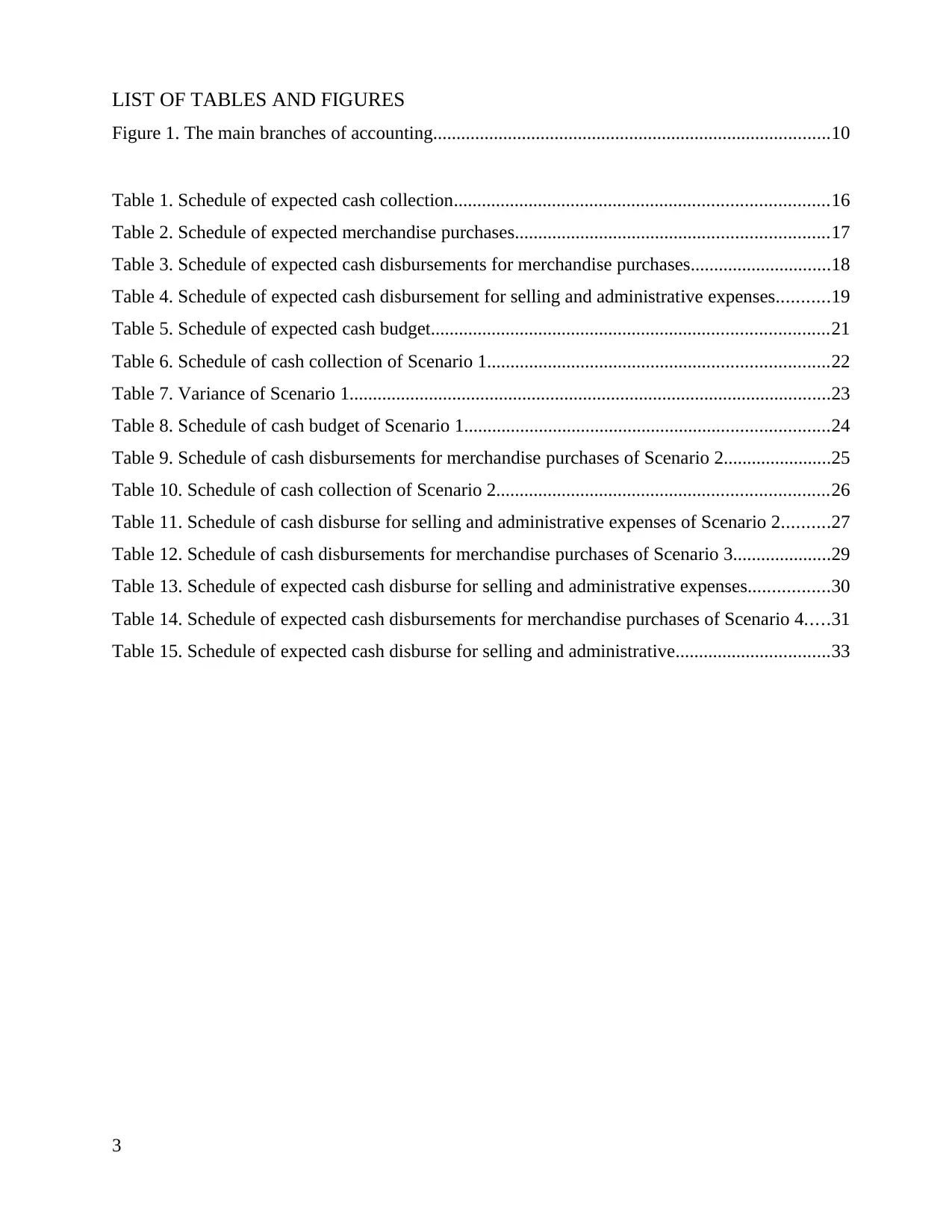
LIST OF TABLES AND FIGURES
Figure 1. The main branches of accounting.....................................................................................10
Table 1. Schedule of expected cash collection................................................................................16
Table 2. Schedule of expected merchandise purchases...................................................................17
Table 3. Schedule of expected cash disbursements for merchandise purchases..............................18
Table 4. Schedule of expected cash disbursement for selling and administrative expenses...........19
Table 5. Schedule of expected cash budget.....................................................................................21
Table 6. Schedule of cash collection of Scenario 1.........................................................................22
Table 7. Variance of Scenario 1.......................................................................................................23
Table 8. Schedule of cash budget of Scenario 1..............................................................................24
Table 9. Schedule of cash disbursements for merchandise purchases of Scenario 2.......................25
Table 10. Schedule of cash collection of Scenario 2.......................................................................26
Table 11. Schedule of cash disburse for selling and administrative expenses of Scenario 2..........27
Table 12. Schedule of cash disbursements for merchandise purchases of Scenario 3.....................29
Table 13. Schedule of expected cash disburse for selling and administrative expenses.................30
Table 14. Schedule of expected cash disbursements for merchandise purchases of Scenario 4.....31
Table 15. Schedule of expected cash disburse for selling and administrative.................................33
3
Figure 1. The main branches of accounting.....................................................................................10
Table 1. Schedule of expected cash collection................................................................................16
Table 2. Schedule of expected merchandise purchases...................................................................17
Table 3. Schedule of expected cash disbursements for merchandise purchases..............................18
Table 4. Schedule of expected cash disbursement for selling and administrative expenses...........19
Table 5. Schedule of expected cash budget.....................................................................................21
Table 6. Schedule of cash collection of Scenario 1.........................................................................22
Table 7. Variance of Scenario 1.......................................................................................................23
Table 8. Schedule of cash budget of Scenario 1..............................................................................24
Table 9. Schedule of cash disbursements for merchandise purchases of Scenario 2.......................25
Table 10. Schedule of cash collection of Scenario 2.......................................................................26
Table 11. Schedule of cash disburse for selling and administrative expenses of Scenario 2..........27
Table 12. Schedule of cash disbursements for merchandise purchases of Scenario 3.....................29
Table 13. Schedule of expected cash disburse for selling and administrative expenses.................30
Table 14. Schedule of expected cash disbursements for merchandise purchases of Scenario 4.....31
Table 15. Schedule of expected cash disburse for selling and administrative.................................33
3
⊘ This is a preview!⊘
Do you want full access?
Subscribe today to unlock all pages.

Trusted by 1+ million students worldwide
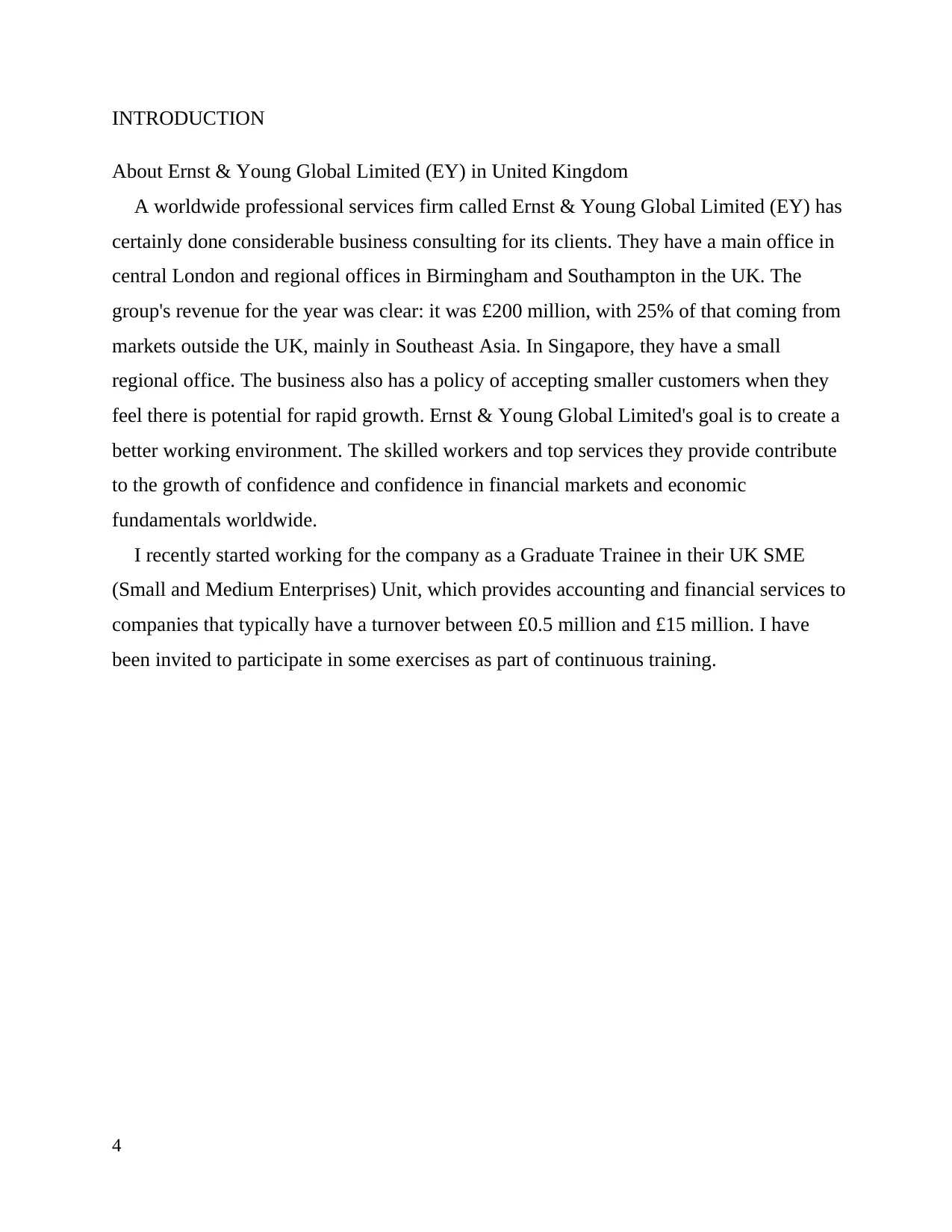
INTRODUCTION
About Ernst & Young Global Limited (EY) in United Kingdom
A worldwide professional services firm called Ernst & Young Global Limited (EY) has
certainly done considerable business consulting for its clients. They have a main office in
central London and regional offices in Birmingham and Southampton in the UK. The
group's revenue for the year was clear: it was £200 million, with 25% of that coming from
markets outside the UK, mainly in Southeast Asia. In Singapore, they have a small
regional office. The business also has a policy of accepting smaller customers when they
feel there is potential for rapid growth. Ernst & Young Global Limited's goal is to create a
better working environment. The skilled workers and top services they provide contribute
to the growth of confidence and confidence in financial markets and economic
fundamentals worldwide.
I recently started working for the company as a Graduate Trainee in their UK SME
(Small and Medium Enterprises) Unit, which provides accounting and financial services to
companies that typically have a turnover between £0.5 million and £15 million. I have
been invited to participate in some exercises as part of continuous training.
4
About Ernst & Young Global Limited (EY) in United Kingdom
A worldwide professional services firm called Ernst & Young Global Limited (EY) has
certainly done considerable business consulting for its clients. They have a main office in
central London and regional offices in Birmingham and Southampton in the UK. The
group's revenue for the year was clear: it was £200 million, with 25% of that coming from
markets outside the UK, mainly in Southeast Asia. In Singapore, they have a small
regional office. The business also has a policy of accepting smaller customers when they
feel there is potential for rapid growth. Ernst & Young Global Limited's goal is to create a
better working environment. The skilled workers and top services they provide contribute
to the growth of confidence and confidence in financial markets and economic
fundamentals worldwide.
I recently started working for the company as a Graduate Trainee in their UK SME
(Small and Medium Enterprises) Unit, which provides accounting and financial services to
companies that typically have a turnover between £0.5 million and £15 million. I have
been invited to participate in some exercises as part of continuous training.
4
Paraphrase This Document
Need a fresh take? Get an instant paraphrase of this document with our AI Paraphraser
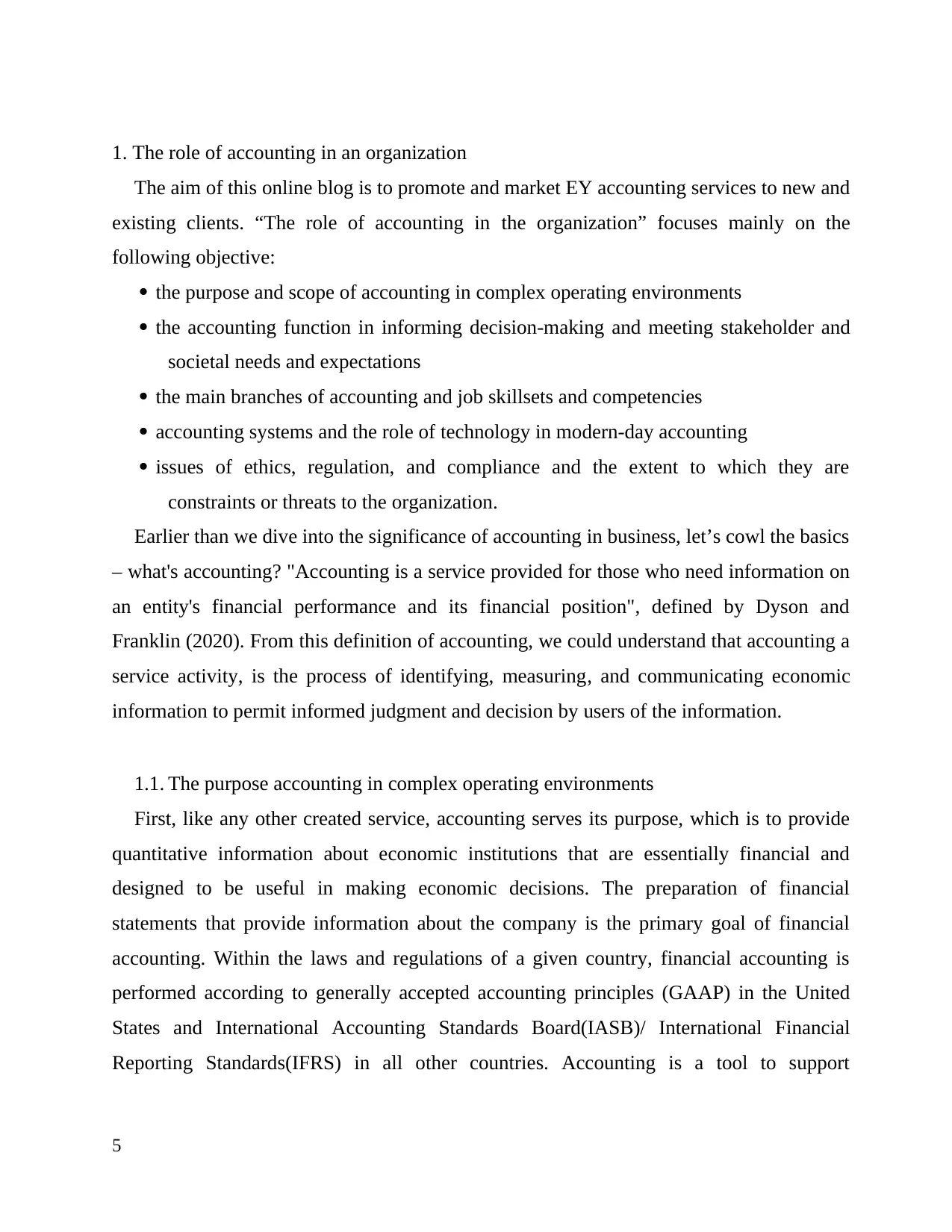
1. The role of accounting in an organization
The aim of this online blog is to promote and market EY accounting services to new and
existing clients. “The role of accounting in the organization” focuses mainly on the
following objective:
the purpose and scope of accounting in complex operating environments
the accounting function in informing decision-making and meeting stakeholder and
societal needs and expectations
the main branches of accounting and job skillsets and competencies
accounting systems and the role of technology in modern-day accounting
issues of ethics, regulation, and compliance and the extent to which they are
constraints or threats to the organization.
Earlier than we dive into the significance of accounting in business, let’s cowl the basics
– what's accounting? "Accounting is a service provided for those who need information on
an entity's financial performance and its financial position", defined by Dyson and
Franklin (2020). From this definition of accounting, we could understand that accounting a
service activity, is the process of identifying, measuring, and communicating economic
information to permit informed judgment and decision by users of the information.
1.1. The purpose accounting in complex operating environments
First, like any other created service, accounting serves its purpose, which is to provide
quantitative information about economic institutions that are essentially financial and
designed to be useful in making economic decisions. The preparation of financial
statements that provide information about the company is the primary goal of financial
accounting. Within the laws and regulations of a given country, financial accounting is
performed according to generally accepted accounting principles (GAAP) in the United
States and International Accounting Standards Board(IASB)/ International Financial
Reporting Standards(IFRS) in all other countries. Accounting is a tool to support
5
The aim of this online blog is to promote and market EY accounting services to new and
existing clients. “The role of accounting in the organization” focuses mainly on the
following objective:
the purpose and scope of accounting in complex operating environments
the accounting function in informing decision-making and meeting stakeholder and
societal needs and expectations
the main branches of accounting and job skillsets and competencies
accounting systems and the role of technology in modern-day accounting
issues of ethics, regulation, and compliance and the extent to which they are
constraints or threats to the organization.
Earlier than we dive into the significance of accounting in business, let’s cowl the basics
– what's accounting? "Accounting is a service provided for those who need information on
an entity's financial performance and its financial position", defined by Dyson and
Franklin (2020). From this definition of accounting, we could understand that accounting a
service activity, is the process of identifying, measuring, and communicating economic
information to permit informed judgment and decision by users of the information.
1.1. The purpose accounting in complex operating environments
First, like any other created service, accounting serves its purpose, which is to provide
quantitative information about economic institutions that are essentially financial and
designed to be useful in making economic decisions. The preparation of financial
statements that provide information about the company is the primary goal of financial
accounting. Within the laws and regulations of a given country, financial accounting is
performed according to generally accepted accounting principles (GAAP) in the United
States and International Accounting Standards Board(IASB)/ International Financial
Reporting Standards(IFRS) in all other countries. Accounting is a tool to support
5
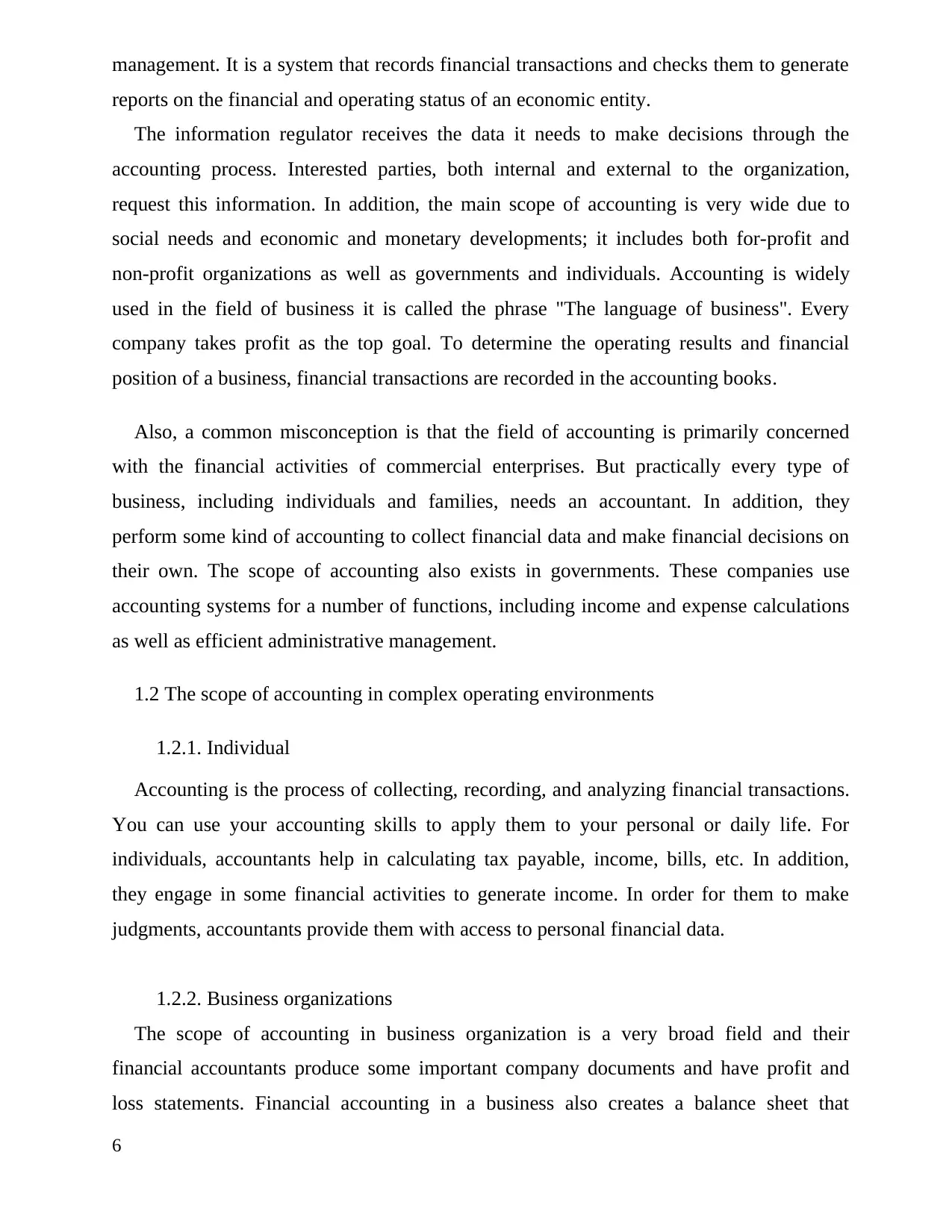
management. It is a system that records financial transactions and checks them to generate
reports on the financial and operating status of an economic entity.
The information regulator receives the data it needs to make decisions through the
accounting process. Interested parties, both internal and external to the organization,
request this information. In addition, the main scope of accounting is very wide due to
social needs and economic and monetary developments; it includes both for-profit and
non-profit organizations as well as governments and individuals. Accounting is widely
used in the field of business it is called the phrase "The language of business". Every
company takes profit as the top goal. To determine the operating results and financial
position of a business, financial transactions are recorded in the accounting books.
Also, a common misconception is that the field of accounting is primarily concerned
with the financial activities of commercial enterprises. But practically every type of
business, including individuals and families, needs an accountant. In addition, they
perform some kind of accounting to collect financial data and make financial decisions on
their own. The scope of accounting also exists in governments. These companies use
accounting systems for a number of functions, including income and expense calculations
as well as efficient administrative management.
1.2 The scope of accounting in complex operating environments
1.2.1. Individual
Accounting is the process of collecting, recording, and analyzing financial transactions.
You can use your accounting skills to apply them to your personal or daily life. For
individuals, accountants help in calculating tax payable, income, bills, etc. In addition,
they engage in some financial activities to generate income. In order for them to make
judgments, accountants provide them with access to personal financial data.
1.2.2. Business organizations
The scope of accounting in business organization is a very broad field and their
financial accountants produce some important company documents and have profit and
loss statements. Financial accounting in a business also creates a balance sheet that
6
reports on the financial and operating status of an economic entity.
The information regulator receives the data it needs to make decisions through the
accounting process. Interested parties, both internal and external to the organization,
request this information. In addition, the main scope of accounting is very wide due to
social needs and economic and monetary developments; it includes both for-profit and
non-profit organizations as well as governments and individuals. Accounting is widely
used in the field of business it is called the phrase "The language of business". Every
company takes profit as the top goal. To determine the operating results and financial
position of a business, financial transactions are recorded in the accounting books.
Also, a common misconception is that the field of accounting is primarily concerned
with the financial activities of commercial enterprises. But practically every type of
business, including individuals and families, needs an accountant. In addition, they
perform some kind of accounting to collect financial data and make financial decisions on
their own. The scope of accounting also exists in governments. These companies use
accounting systems for a number of functions, including income and expense calculations
as well as efficient administrative management.
1.2 The scope of accounting in complex operating environments
1.2.1. Individual
Accounting is the process of collecting, recording, and analyzing financial transactions.
You can use your accounting skills to apply them to your personal or daily life. For
individuals, accountants help in calculating tax payable, income, bills, etc. In addition,
they engage in some financial activities to generate income. In order for them to make
judgments, accountants provide them with access to personal financial data.
1.2.2. Business organizations
The scope of accounting in business organization is a very broad field and their
financial accountants produce some important company documents and have profit and
loss statements. Financial accounting in a business also creates a balance sheet that
6
⊘ This is a preview!⊘
Do you want full access?
Subscribe today to unlock all pages.

Trusted by 1+ million students worldwide
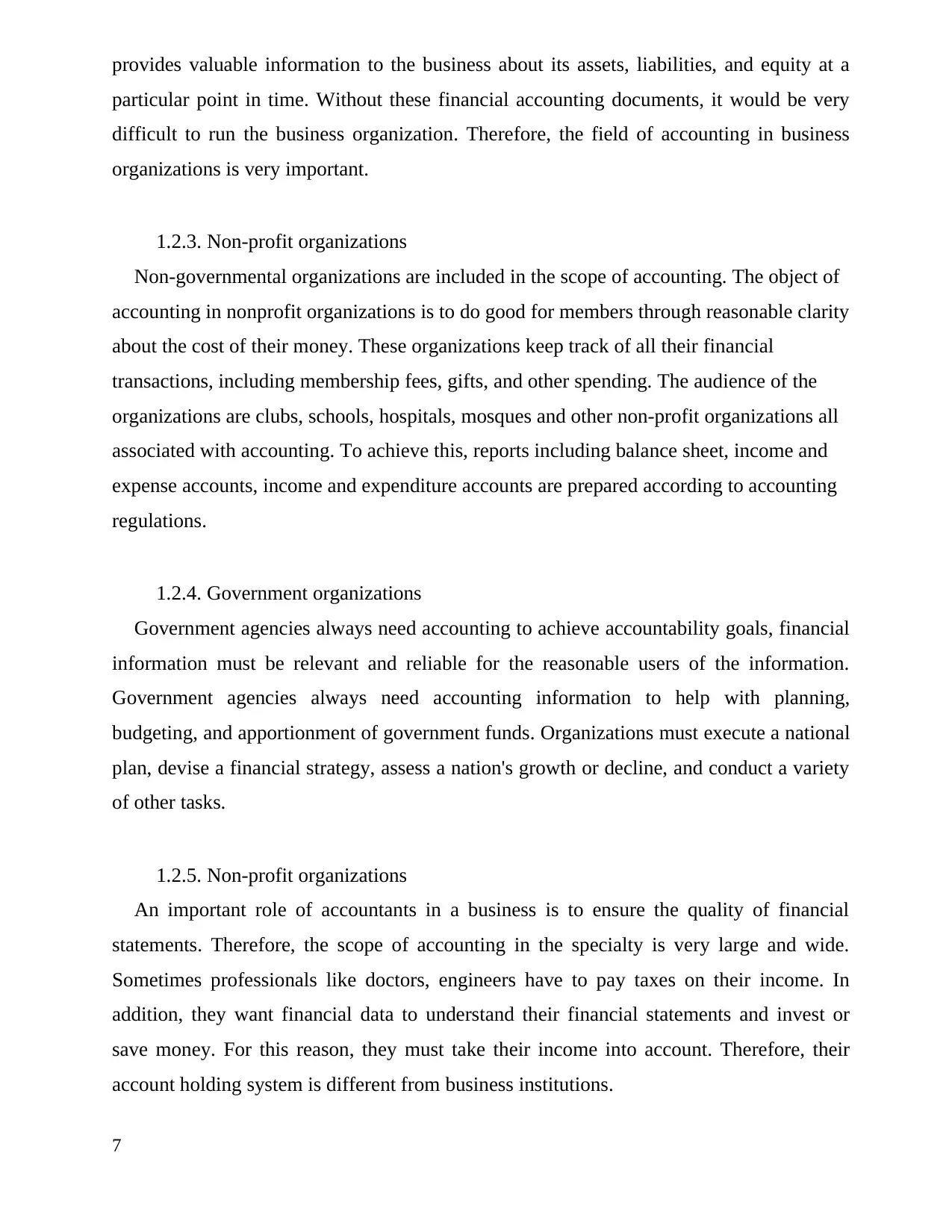
provides valuable information to the business about its assets, liabilities, and equity at a
particular point in time. Without these financial accounting documents, it would be very
difficult to run the business organization. Therefore, the field of accounting in business
organizations is very important.
1.2.3. Non-profit organizations
Non-governmental organizations are included in the scope of accounting. The object of
accounting in nonprofit organizations is to do good for members through reasonable clarity
about the cost of their money. These organizations keep track of all their financial
transactions, including membership fees, gifts, and other spending. The audience of the
organizations are clubs, schools, hospitals, mosques and other non-profit organizations all
associated with accounting. To achieve this, reports including balance sheet, income and
expense accounts, income and expenditure accounts are prepared according to accounting
regulations.
1.2.4. Government organizations
Government agencies always need accounting to achieve accountability goals, financial
information must be relevant and reliable for the reasonable users of the information.
Government agencies always need accounting information to help with planning,
budgeting, and apportionment of government funds. Organizations must execute a national
plan, devise a financial strategy, assess a nation's growth or decline, and conduct a variety
of other tasks.
1.2.5. Non-profit organizations
An important role of accountants in a business is to ensure the quality of financial
statements. Therefore, the scope of accounting in the specialty is very large and wide.
Sometimes professionals like doctors, engineers have to pay taxes on their income. In
addition, they want financial data to understand their financial statements and invest or
save money. For this reason, they must take their income into account. Therefore, their
account holding system is different from business institutions.
7
particular point in time. Without these financial accounting documents, it would be very
difficult to run the business organization. Therefore, the field of accounting in business
organizations is very important.
1.2.3. Non-profit organizations
Non-governmental organizations are included in the scope of accounting. The object of
accounting in nonprofit organizations is to do good for members through reasonable clarity
about the cost of their money. These organizations keep track of all their financial
transactions, including membership fees, gifts, and other spending. The audience of the
organizations are clubs, schools, hospitals, mosques and other non-profit organizations all
associated with accounting. To achieve this, reports including balance sheet, income and
expense accounts, income and expenditure accounts are prepared according to accounting
regulations.
1.2.4. Government organizations
Government agencies always need accounting to achieve accountability goals, financial
information must be relevant and reliable for the reasonable users of the information.
Government agencies always need accounting information to help with planning,
budgeting, and apportionment of government funds. Organizations must execute a national
plan, devise a financial strategy, assess a nation's growth or decline, and conduct a variety
of other tasks.
1.2.5. Non-profit organizations
An important role of accountants in a business is to ensure the quality of financial
statements. Therefore, the scope of accounting in the specialty is very large and wide.
Sometimes professionals like doctors, engineers have to pay taxes on their income. In
addition, they want financial data to understand their financial statements and invest or
save money. For this reason, they must take their income into account. Therefore, their
account holding system is different from business institutions.
7
Paraphrase This Document
Need a fresh take? Get an instant paraphrase of this document with our AI Paraphraser
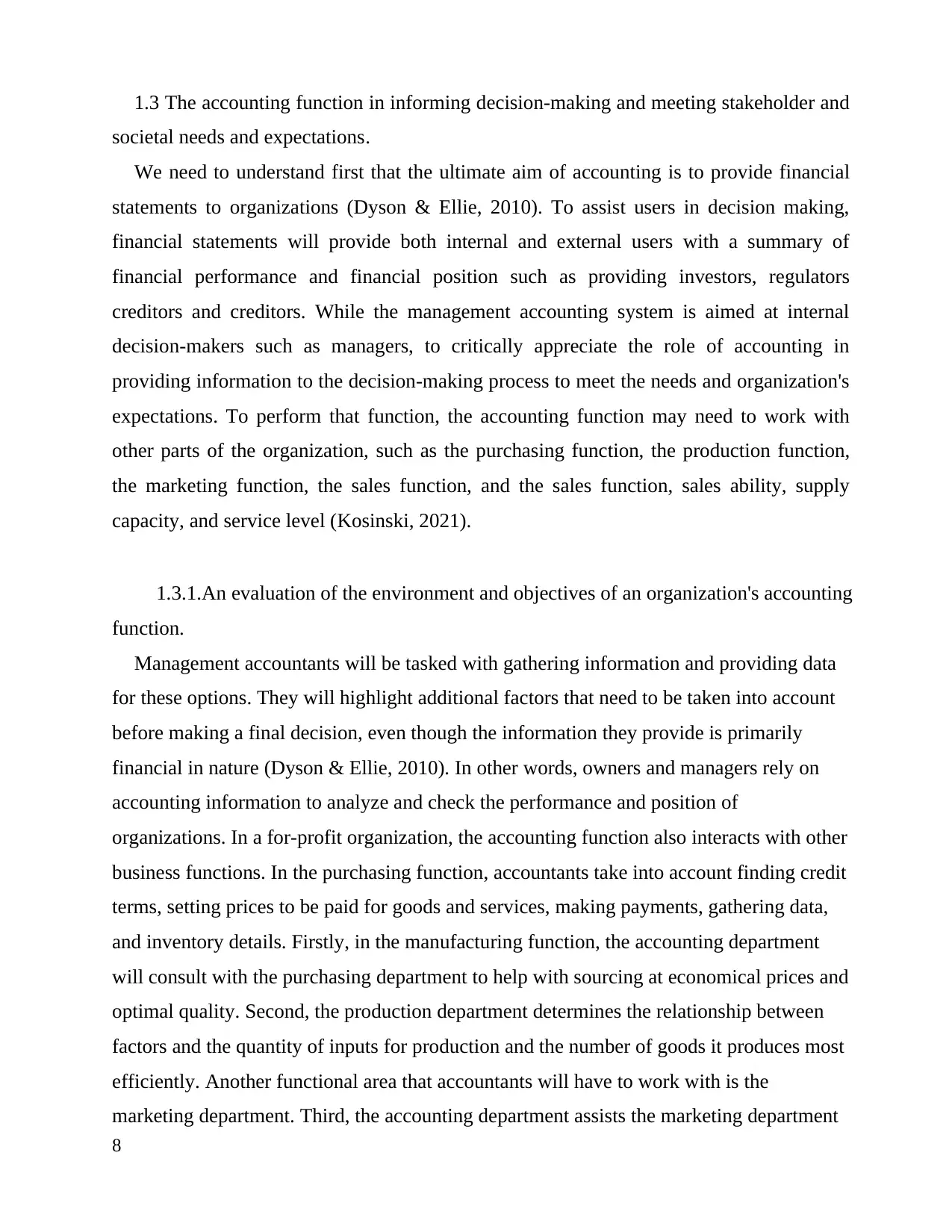
1.3 The accounting function in informing decision-making and meeting stakeholder and
societal needs and expectations.
We need to understand first that the ultimate aim of accounting is to provide financial
statements to organizations (Dyson & Ellie, 2010). To assist users in decision making,
financial statements will provide both internal and external users with a summary of
financial performance and financial position such as providing investors, regulators
creditors and creditors. While the management accounting system is aimed at internal
decision-makers such as managers, to critically appreciate the role of accounting in
providing information to the decision-making process to meet the needs and organization's
expectations. To perform that function, the accounting function may need to work with
other parts of the organization, such as the purchasing function, the production function,
the marketing function, the sales function, and the sales function, sales ability, supply
capacity, and service level (Kosinski, 2021).
1.3.1.An evaluation of the environment and objectives of an organization's accounting
function.
Management accountants will be tasked with gathering information and providing data
for these options. They will highlight additional factors that need to be taken into account
before making a final decision, even though the information they provide is primarily
financial in nature (Dyson & Ellie, 2010). In other words, owners and managers rely on
accounting information to analyze and check the performance and position of
organizations. In a for-profit organization, the accounting function also interacts with other
business functions. In the purchasing function, accountants take into account finding credit
terms, setting prices to be paid for goods and services, making payments, gathering data,
and inventory details. Firstly, in the manufacturing function, the accounting department
will consult with the purchasing department to help with sourcing at economical prices and
optimal quality. Second, the production department determines the relationship between
factors and the quantity of inputs for production and the number of goods it produces most
efficiently. Another functional area that accountants will have to work with is the
marketing department. Third, the accounting department assists the marketing department
8
societal needs and expectations.
We need to understand first that the ultimate aim of accounting is to provide financial
statements to organizations (Dyson & Ellie, 2010). To assist users in decision making,
financial statements will provide both internal and external users with a summary of
financial performance and financial position such as providing investors, regulators
creditors and creditors. While the management accounting system is aimed at internal
decision-makers such as managers, to critically appreciate the role of accounting in
providing information to the decision-making process to meet the needs and organization's
expectations. To perform that function, the accounting function may need to work with
other parts of the organization, such as the purchasing function, the production function,
the marketing function, the sales function, and the sales function, sales ability, supply
capacity, and service level (Kosinski, 2021).
1.3.1.An evaluation of the environment and objectives of an organization's accounting
function.
Management accountants will be tasked with gathering information and providing data
for these options. They will highlight additional factors that need to be taken into account
before making a final decision, even though the information they provide is primarily
financial in nature (Dyson & Ellie, 2010). In other words, owners and managers rely on
accounting information to analyze and check the performance and position of
organizations. In a for-profit organization, the accounting function also interacts with other
business functions. In the purchasing function, accountants take into account finding credit
terms, setting prices to be paid for goods and services, making payments, gathering data,
and inventory details. Firstly, in the manufacturing function, the accounting department
will consult with the purchasing department to help with sourcing at economical prices and
optimal quality. Second, the production department determines the relationship between
factors and the quantity of inputs for production and the number of goods it produces most
efficiently. Another functional area that accountants will have to work with is the
marketing department. Third, the accounting department assists the marketing department
8
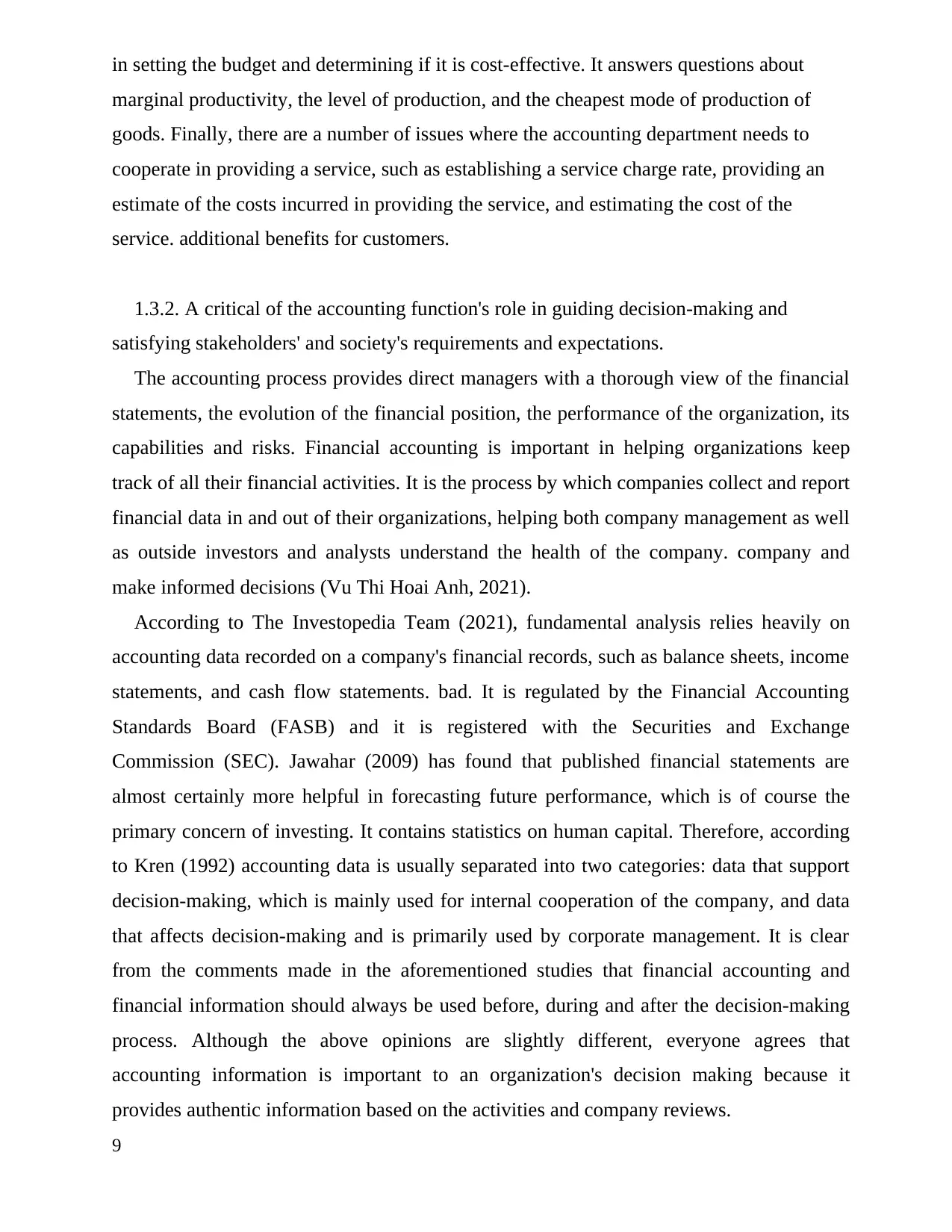
in setting the budget and determining if it is cost-effective. It answers questions about
marginal productivity, the level of production, and the cheapest mode of production of
goods. Finally, there are a number of issues where the accounting department needs to
cooperate in providing a service, such as establishing a service charge rate, providing an
estimate of the costs incurred in providing the service, and estimating the cost of the
service. additional benefits for customers.
1.3.2. A critical of the accounting function's role in guiding decision-making and
satisfying stakeholders' and society's requirements and expectations.
The accounting process provides direct managers with a thorough view of the financial
statements, the evolution of the financial position, the performance of the organization, its
capabilities and risks. Financial accounting is important in helping organizations keep
track of all their financial activities. It is the process by which companies collect and report
financial data in and out of their organizations, helping both company management as well
as outside investors and analysts understand the health of the company. company and
make informed decisions (Vu Thi Hoai Anh, 2021).
According to The Investopedia Team (2021), fundamental analysis relies heavily on
accounting data recorded on a company's financial records, such as balance sheets, income
statements, and cash flow statements. bad. It is regulated by the Financial Accounting
Standards Board (FASB) and it is registered with the Securities and Exchange
Commission (SEC). Jawahar (2009) has found that published financial statements are
almost certainly more helpful in forecasting future performance, which is of course the
primary concern of investing. It contains statistics on human capital. Therefore, according
to Kren (1992) accounting data is usually separated into two categories: data that support
decision-making, which is mainly used for internal cooperation of the company, and data
that affects decision-making and is primarily used by corporate management. It is clear
from the comments made in the aforementioned studies that financial accounting and
financial information should always be used before, during and after the decision-making
process. Although the above opinions are slightly different, everyone agrees that
accounting information is important to an organization's decision making because it
provides authentic information based on the activities and company reviews.
9
marginal productivity, the level of production, and the cheapest mode of production of
goods. Finally, there are a number of issues where the accounting department needs to
cooperate in providing a service, such as establishing a service charge rate, providing an
estimate of the costs incurred in providing the service, and estimating the cost of the
service. additional benefits for customers.
1.3.2. A critical of the accounting function's role in guiding decision-making and
satisfying stakeholders' and society's requirements and expectations.
The accounting process provides direct managers with a thorough view of the financial
statements, the evolution of the financial position, the performance of the organization, its
capabilities and risks. Financial accounting is important in helping organizations keep
track of all their financial activities. It is the process by which companies collect and report
financial data in and out of their organizations, helping both company management as well
as outside investors and analysts understand the health of the company. company and
make informed decisions (Vu Thi Hoai Anh, 2021).
According to The Investopedia Team (2021), fundamental analysis relies heavily on
accounting data recorded on a company's financial records, such as balance sheets, income
statements, and cash flow statements. bad. It is regulated by the Financial Accounting
Standards Board (FASB) and it is registered with the Securities and Exchange
Commission (SEC). Jawahar (2009) has found that published financial statements are
almost certainly more helpful in forecasting future performance, which is of course the
primary concern of investing. It contains statistics on human capital. Therefore, according
to Kren (1992) accounting data is usually separated into two categories: data that support
decision-making, which is mainly used for internal cooperation of the company, and data
that affects decision-making and is primarily used by corporate management. It is clear
from the comments made in the aforementioned studies that financial accounting and
financial information should always be used before, during and after the decision-making
process. Although the above opinions are slightly different, everyone agrees that
accounting information is important to an organization's decision making because it
provides authentic information based on the activities and company reviews.
9
⊘ This is a preview!⊘
Do you want full access?
Subscribe today to unlock all pages.

Trusted by 1+ million students worldwide
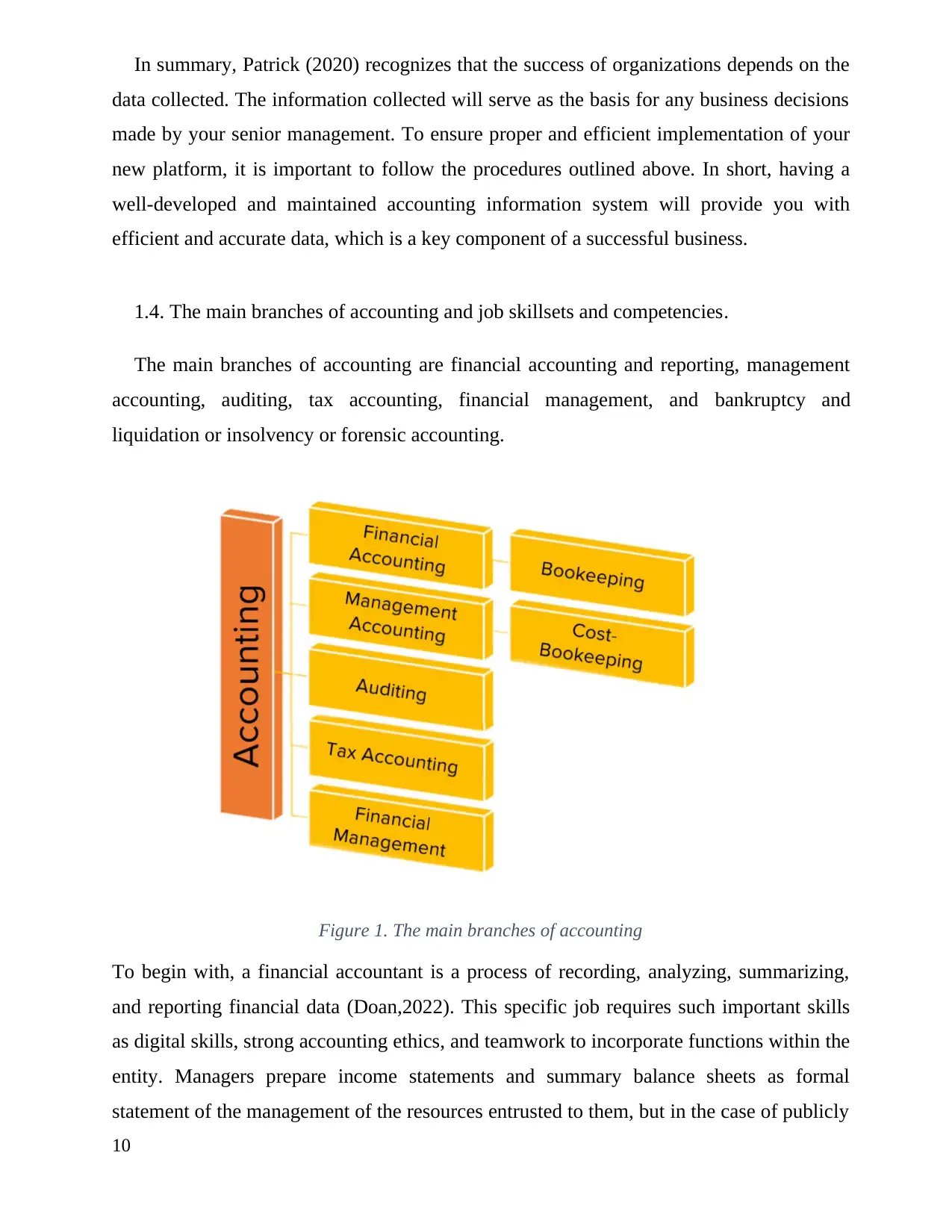
In summary, Patrick (2020) recognizes that the success of organizations depends on the
data collected. The information collected will serve as the basis for any business decisions
made by your senior management. To ensure proper and efficient implementation of your
new platform, it is important to follow the procedures outlined above. In short, having a
well-developed and maintained accounting information system will provide you with
efficient and accurate data, which is a key component of a successful business.
1.4. The main branches of accounting and job skillsets and competencies.
The main branches of accounting are financial accounting and reporting, management
accounting, auditing, tax accounting, financial management, and bankruptcy and
liquidation or insolvency or forensic accounting.
Figure 1. The main branches of accounting
To begin with, a financial accountant is a process of recording, analyzing, summarizing,
and reporting financial data (Doan,2022). This specific job requires such important skills
as digital skills, strong accounting ethics, and teamwork to incorporate functions within the
entity. Managers prepare income statements and summary balance sheets as formal
statement of the management of the resources entrusted to them, but in the case of publicly
10
data collected. The information collected will serve as the basis for any business decisions
made by your senior management. To ensure proper and efficient implementation of your
new platform, it is important to follow the procedures outlined above. In short, having a
well-developed and maintained accounting information system will provide you with
efficient and accurate data, which is a key component of a successful business.
1.4. The main branches of accounting and job skillsets and competencies.
The main branches of accounting are financial accounting and reporting, management
accounting, auditing, tax accounting, financial management, and bankruptcy and
liquidation or insolvency or forensic accounting.
Figure 1. The main branches of accounting
To begin with, a financial accountant is a process of recording, analyzing, summarizing,
and reporting financial data (Doan,2022). This specific job requires such important skills
as digital skills, strong accounting ethics, and teamwork to incorporate functions within the
entity. Managers prepare income statements and summary balance sheets as formal
statement of the management of the resources entrusted to them, but in the case of publicly
10
Paraphrase This Document
Need a fresh take? Get an instant paraphrase of this document with our AI Paraphraser
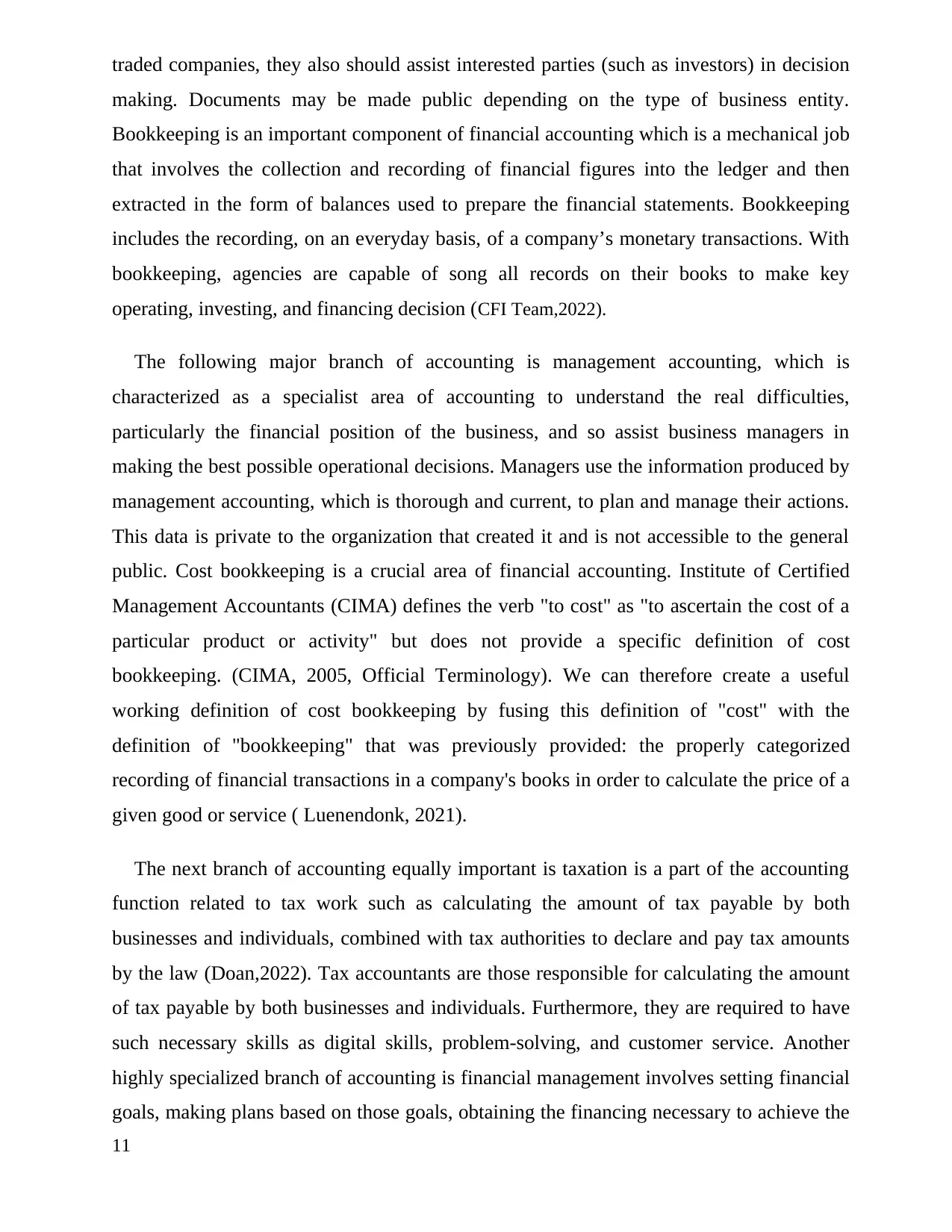
traded companies, they also should assist interested parties (such as investors) in decision
making. Documents may be made public depending on the type of business entity.
Bookkeeping is an important component of financial accounting which is a mechanical job
that involves the collection and recording of financial figures into the ledger and then
extracted in the form of balances used to prepare the financial statements. Bookkeeping
includes the recording, on an everyday basis, of a company’s monetary transactions. With
bookkeeping, agencies are capable of song all records on their books to make key
operating, investing, and financing decision (CFI Team,2022).
The following major branch of accounting is management accounting, which is
characterized as a specialist area of accounting to understand the real difficulties,
particularly the financial position of the business, and so assist business managers in
making the best possible operational decisions. Managers use the information produced by
management accounting, which is thorough and current, to plan and manage their actions.
This data is private to the organization that created it and is not accessible to the general
public. Cost bookkeeping is a crucial area of financial accounting. Institute of Certified
Management Accountants (CIMA) defines the verb "to cost" as "to ascertain the cost of a
particular product or activity" but does not provide a specific definition of cost
bookkeeping. (CIMA, 2005, Official Terminology). We can therefore create a useful
working definition of cost bookkeeping by fusing this definition of "cost" with the
definition of "bookkeeping" that was previously provided: the properly categorized
recording of financial transactions in a company's books in order to calculate the price of a
given good or service ( Luenendonk, 2021).
The next branch of accounting equally important is taxation is a part of the accounting
function related to tax work such as calculating the amount of tax payable by both
businesses and individuals, combined with tax authorities to declare and pay tax amounts
by the law (Doan,2022). Tax accountants are those responsible for calculating the amount
of tax payable by both businesses and individuals. Furthermore, they are required to have
such necessary skills as digital skills, problem-solving, and customer service. Another
highly specialized branch of accounting is financial management involves setting financial
goals, making plans based on those goals, obtaining the financing necessary to achieve the
11
making. Documents may be made public depending on the type of business entity.
Bookkeeping is an important component of financial accounting which is a mechanical job
that involves the collection and recording of financial figures into the ledger and then
extracted in the form of balances used to prepare the financial statements. Bookkeeping
includes the recording, on an everyday basis, of a company’s monetary transactions. With
bookkeeping, agencies are capable of song all records on their books to make key
operating, investing, and financing decision (CFI Team,2022).
The following major branch of accounting is management accounting, which is
characterized as a specialist area of accounting to understand the real difficulties,
particularly the financial position of the business, and so assist business managers in
making the best possible operational decisions. Managers use the information produced by
management accounting, which is thorough and current, to plan and manage their actions.
This data is private to the organization that created it and is not accessible to the general
public. Cost bookkeeping is a crucial area of financial accounting. Institute of Certified
Management Accountants (CIMA) defines the verb "to cost" as "to ascertain the cost of a
particular product or activity" but does not provide a specific definition of cost
bookkeeping. (CIMA, 2005, Official Terminology). We can therefore create a useful
working definition of cost bookkeeping by fusing this definition of "cost" with the
definition of "bookkeeping" that was previously provided: the properly categorized
recording of financial transactions in a company's books in order to calculate the price of a
given good or service ( Luenendonk, 2021).
The next branch of accounting equally important is taxation is a part of the accounting
function related to tax work such as calculating the amount of tax payable by both
businesses and individuals, combined with tax authorities to declare and pay tax amounts
by the law (Doan,2022). Tax accountants are those responsible for calculating the amount
of tax payable by both businesses and individuals. Furthermore, they are required to have
such necessary skills as digital skills, problem-solving, and customer service. Another
highly specialized branch of accounting is financial management involves setting financial
goals, making plans based on those goals, obtaining the financing necessary to achieve the
11
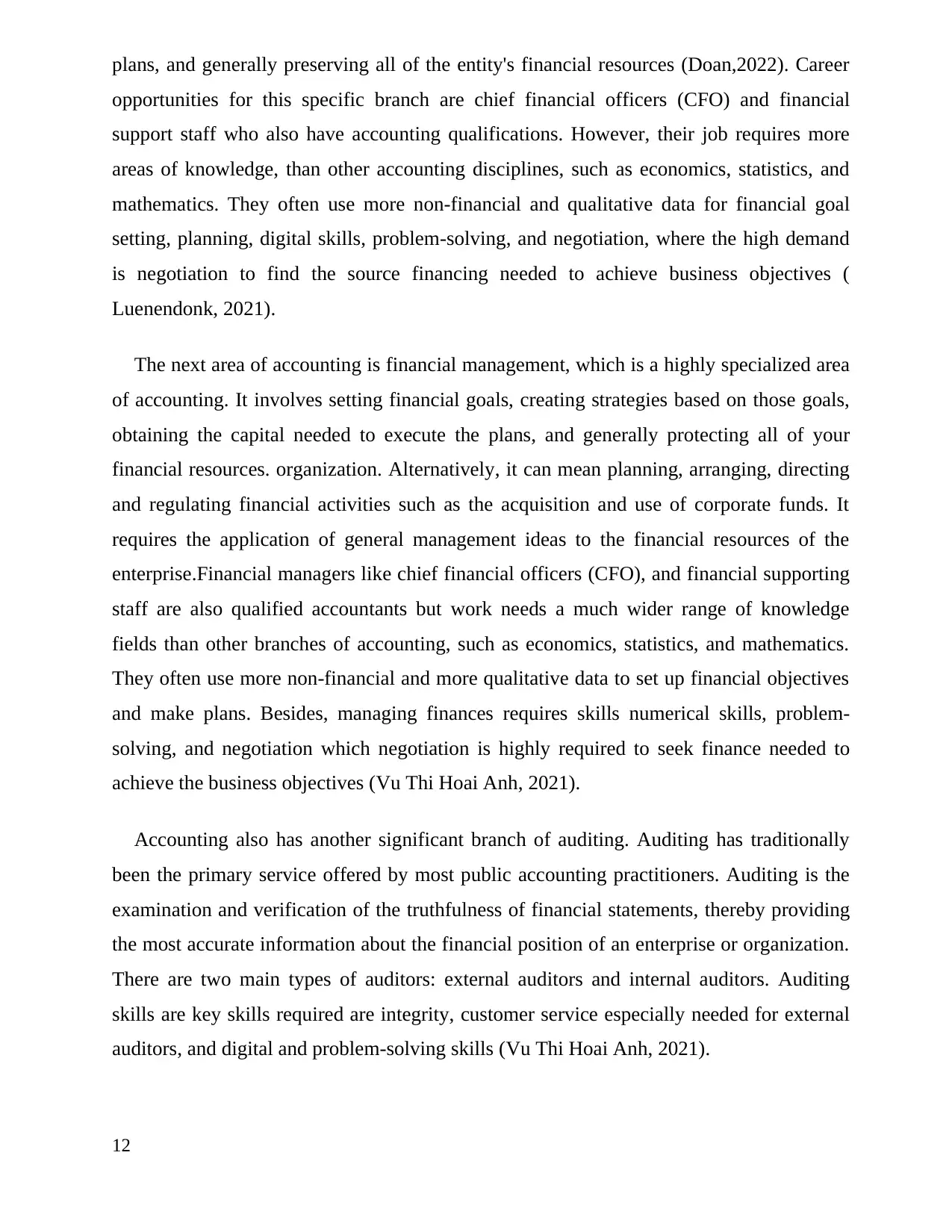
plans, and generally preserving all of the entity's financial resources (Doan,2022). Career
opportunities for this specific branch are chief financial officers (CFO) and financial
support staff who also have accounting qualifications. However, their job requires more
areas of knowledge, than other accounting disciplines, such as economics, statistics, and
mathematics. They often use more non-financial and qualitative data for financial goal
setting, planning, digital skills, problem-solving, and negotiation, where the high demand
is negotiation to find the source financing needed to achieve business objectives (
Luenendonk, 2021).
The next area of accounting is financial management, which is a highly specialized area
of accounting. It involves setting financial goals, creating strategies based on those goals,
obtaining the capital needed to execute the plans, and generally protecting all of your
financial resources. organization. Alternatively, it can mean planning, arranging, directing
and regulating financial activities such as the acquisition and use of corporate funds. It
requires the application of general management ideas to the financial resources of the
enterprise.Financial managers like chief financial officers (CFO), and financial supporting
staff are also qualified accountants but work needs a much wider range of knowledge
fields than other branches of accounting, such as economics, statistics, and mathematics.
They often use more non-financial and more qualitative data to set up financial objectives
and make plans. Besides, managing finances requires skills numerical skills, problem-
solving, and negotiation which negotiation is highly required to seek finance needed to
achieve the business objectives (Vu Thi Hoai Anh, 2021).
Accounting also has another significant branch of auditing. Auditing has traditionally
been the primary service offered by most public accounting practitioners. Auditing is the
examination and verification of the truthfulness of financial statements, thereby providing
the most accurate information about the financial position of an enterprise or organization.
There are two main types of auditors: external auditors and internal auditors. Auditing
skills are key skills required are integrity, customer service especially needed for external
auditors, and digital and problem-solving skills (Vu Thi Hoai Anh, 2021).
12
opportunities for this specific branch are chief financial officers (CFO) and financial
support staff who also have accounting qualifications. However, their job requires more
areas of knowledge, than other accounting disciplines, such as economics, statistics, and
mathematics. They often use more non-financial and qualitative data for financial goal
setting, planning, digital skills, problem-solving, and negotiation, where the high demand
is negotiation to find the source financing needed to achieve business objectives (
Luenendonk, 2021).
The next area of accounting is financial management, which is a highly specialized area
of accounting. It involves setting financial goals, creating strategies based on those goals,
obtaining the capital needed to execute the plans, and generally protecting all of your
financial resources. organization. Alternatively, it can mean planning, arranging, directing
and regulating financial activities such as the acquisition and use of corporate funds. It
requires the application of general management ideas to the financial resources of the
enterprise.Financial managers like chief financial officers (CFO), and financial supporting
staff are also qualified accountants but work needs a much wider range of knowledge
fields than other branches of accounting, such as economics, statistics, and mathematics.
They often use more non-financial and more qualitative data to set up financial objectives
and make plans. Besides, managing finances requires skills numerical skills, problem-
solving, and negotiation which negotiation is highly required to seek finance needed to
achieve the business objectives (Vu Thi Hoai Anh, 2021).
Accounting also has another significant branch of auditing. Auditing has traditionally
been the primary service offered by most public accounting practitioners. Auditing is the
examination and verification of the truthfulness of financial statements, thereby providing
the most accurate information about the financial position of an enterprise or organization.
There are two main types of auditors: external auditors and internal auditors. Auditing
skills are key skills required are integrity, customer service especially needed for external
auditors, and digital and problem-solving skills (Vu Thi Hoai Anh, 2021).
12
⊘ This is a preview!⊘
Do you want full access?
Subscribe today to unlock all pages.

Trusted by 1+ million students worldwide
1 out of 42
Related Documents
Your All-in-One AI-Powered Toolkit for Academic Success.
+13062052269
info@desklib.com
Available 24*7 on WhatsApp / Email
![[object Object]](/_next/static/media/star-bottom.7253800d.svg)
Unlock your academic potential
Copyright © 2020–2026 A2Z Services. All Rights Reserved. Developed and managed by ZUCOL.





